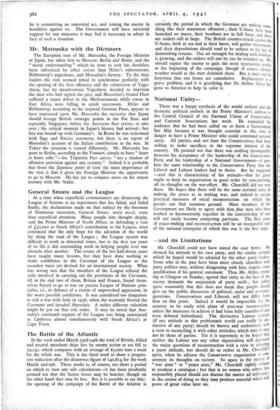National Unity— There was a happy synthesis of the world
outlook and the domestic political outlook in the Prime Minister's address to the Central Council of the National Union of Conservative and Unionist Associations last week. He reminded his audience that he had been called on _to form a Government Est May because it was thought essential in this time of danger to have a Prime Minister who could command national unity. All parties, and not least the Conservatives, had been willing to make sacrifices in the supreme interest of the country. He pointed out that there was nothing incompatible between his acceptance of the leadership of, the Conservative Party and his leadership of a National Government—it gave him the same relationship to the Conservative Party that the Liberal and Labour leaders had to theirs. But he suggested —and this is characteristic of his attitude—that his party ought to keep its organisation in good order by concentrating all its thoughts on the war-effort. Mr. Churchill did not stop there. He hopes that there will be the same national unity in making the peace as in making war, and indeed in certain practical measures of social reconstruction on which the parties can find common ground. Most members of his Government are likely to agree with him,that men who have worked so harmoniously together in the comradeship of war will not easily become competing partisans. The first years of peace-making and reconstruction will be an inseparable part of the national enterprise of which this war is the first stage.


























 Previous page
Previous page